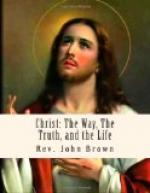1. That grace may be in the soul, and yet not be seen nor observed. This is manifest by daily experience.
2. Not only so, but a gracious soul that is reconciled With God in Christ, and hath the spirit of grace dwelling in it, may suppose itself a stranger yet unto this reconciliation, and void of the grace of God, and so be still in the state of nature.
3. Yea, a soul may not only suppose and conclude itself in nature, while it is in a state of grace, but further, may be filled with terror and apprehensions of God’s wrath and indignation; and that in such a measure, as that thereby it may be as a distracted person, as we see it was with Heman, Psalm lxxxviii. 15, who said, “while I suffer thy terror, I am distracted.” The wrath of God lay hard upon him, and he said, that he was afflicted with all God’s waves, ver. 7. Hence he cried out, vers. 16. 17, “thy fierce wrath goeth over me, thy terrors have cut me off, they came round about me daily,” or all the day, “like water they compassed me about together.” And yet for all this, the first word of his complaint was faith, ver. 1. Many such complaints hear we out of Job’s mouth, to whom God, notwithstanding, was that gracious, that he never came to question his state before God, or to conclude his hypocrisy, or his being still in the state of nature. But it is not so with every one that is so exercised.
4. Yea, further, with those inward strokes upon the soul, they may have sin and guilt charged upon their consciences; and this will make their life yet more bitter, and put a sharper edge upon the rods. Thus was Job made to possess the sins of his youth, Job. xiii. 26, and made to say, “My transgression is sealed up in a bag, and thou sewest up mine iniquity,” Job. xiv. 17.
5. Moreover, they may be in such a condition a long time, and all the while have no light of comfort, as we may see in Job and Heman. They may even walk in darkness, and have no light of comfort, Isa. 1. 10.
6. Yea, and also be without the hope of a delivery or outgate. Hence crieth Heman, Psalm lxxxviii. 4-5, “I am counted with them that go down into the pit, free among the dead, like the slain that lie in the grave, whom thou rememberest no more, and they are cut off from thine hand.” Yea, they may be driven to the very border of despair, and conclude that there is no hope, as the church did, Ezek. xxxvii. 11, “Our bones are dried, and our hope is lost, and we are cut off for our parts;” and as Job, chap. vii. 6, “My days are swifter than a weaver’s shuttle, and are spent without hope;” and chap. xix. 10, “He hath destroyed me on every side, and I am gone: mine hope hath been removed like a tree.”
Now, though sometimes, as we see in Job, and in Heman too, a soul may be under such a sad and sharp dispensation, and yet not brought to question their state, or to conclude themselves children of wrath, lying still in black nature, yet it is not so with all who are so exercised; but many under such a dispensation, may at least be in the dark as to their state before God; and if they do not positively assert their state to be bad, yet they do much question if they be in the state of grace, and would be comforted under all their pressures and afflictions, if they could win to the least well-grounded apprehension of their interest in Christ.




